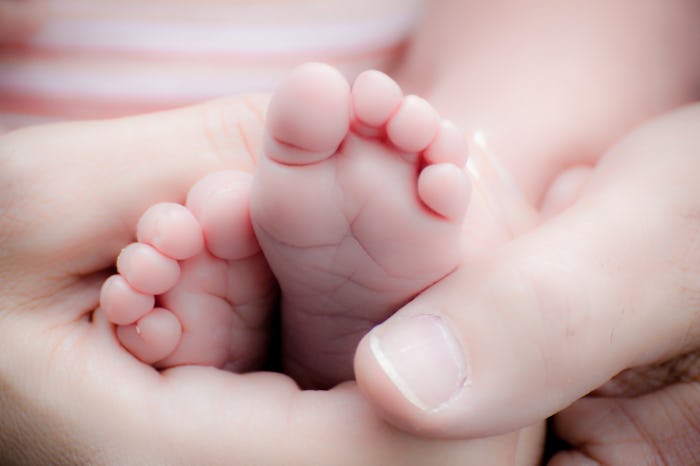Life
A Surrogate Unknowingly Gave Birth To Her Own Biological Son, Due To This Phenomenon
Being a surrogate mother is such an honorable thing for a woman to do. Becoming a surrogate provides another woman with the opportunity to become a mother if their own body won't allow it. Surrogacy stories — and the reasoning behind why mothers decide to become a surrogate — are all so different and very unique. But this story might be one of the most unique stories yet. In California, a surrogate mother unknowingly gave birth to her own biological son and is speaking out about it for a good reason. If it can happen to her, it can happen to anyone.
Let the shock sink in for a second before you read on, because this story is pretty wild. Mom of two boys, Jessica Allen, decided to become a surrogate, according to The Washington Post, because the pay check would allow her and her partner to save for a new house and provide a family with "a blessing of a child." After signing up with a surrogacy firm and being matched with a family, Allen began in-vitro fertilization treatments (IVF) and became pregnant with the couple's baby. But unbeknownst to Allen, she and her husband had "gotten pregnant naturally despite using condoms" after the IVF transfer had already taken place, according to the New York Post.
Needless to say, the unthinkable happened. Allen was pregnant with not only her own biological baby, but the family's baby at the same time, even though she thought she was pregnant with the family's twins the entire time. Allen told the New York Post:
Not once during the pregnancy did any of the medical staff provided by the agency say the babies were in separate sacs. As far as we were concerned, the transferred embryo had split in two and the twins were identical.
Once Allen went into labor, however, she reportedly did not get to see the "twins" and they were given to the family who hired Allen and the surrogacy agency. Almost one month later, according to the New York Post, the new mother thought her babies looked different from one another — and a DNA test proved that one of the "twins" belonged to Allen and her partner.
While getting pregnant with two babies at the same time might seem like an anomaly, science is responsible for this. What happened with Allen is called superfetation, and while uncommon, it does happen.
What Is Superfetation?
Conceiving a child while already pregnant is called superfetation and is incredibly rare, according to The Washington Post. In 2009, Dr. Karen Boyle of the Greater Baltimore Medical Center told Good Morning America that superfetation is so rare that it is almost absent from literature and there are only "about 10 reported cases" of superfetation that have been documented.
Superfetation occurs, according to Baby Center, when a pregnant woman releases a second egg a few weeks into pregnancy. Once the egg becomes fertilized, the women is then pregnant with two babies simultaneously.
While there are only so many limited and reported cases about superfetation, it can really happen to anyone without warning. Last year, an Australian woman gave birth to twins 10 days apart, according to the BBC. The twins were born with different sizes, weights, and gestational development. In 2009, an Arkansas woman became pregnant with a son and a daughter with due dates that were weeks apart, according to TIME.
It is important to note that just because the babies share the same womb does not make them twins. During superfetation, according to Very Well, the fetuses mature differently (especially if it occurs days or weeks apart), thus not making them identical twins. And this medical rarity is incredibly risky. With two fetuses growing at different times and lengths, there is a risk for the babies to be born prematurely, as The New York Times notes.
The other mother eventually gave Allen's biological son back to the surrogacy agency. After negotiations between the agency and Allen's hired lawyer, her biological son was reportedly returned to her. Allen told the New York Post that her son, Malachai, is "doing well" and is learning to walk and starting to speak. But what happened to Allen, while rare, could possibly happen to anyone. She told the New York Post that she does not regret becoming a surrogate mother but she hopes that other women are able to learn from her story.
Watch Romper's new video series, Romper's Doula Diaries:
Check out the entire Romper's Doula Diaries series and other videos on Facebook and the Bustle app across Apple TV, Roku, and Amazon Fire TV.
